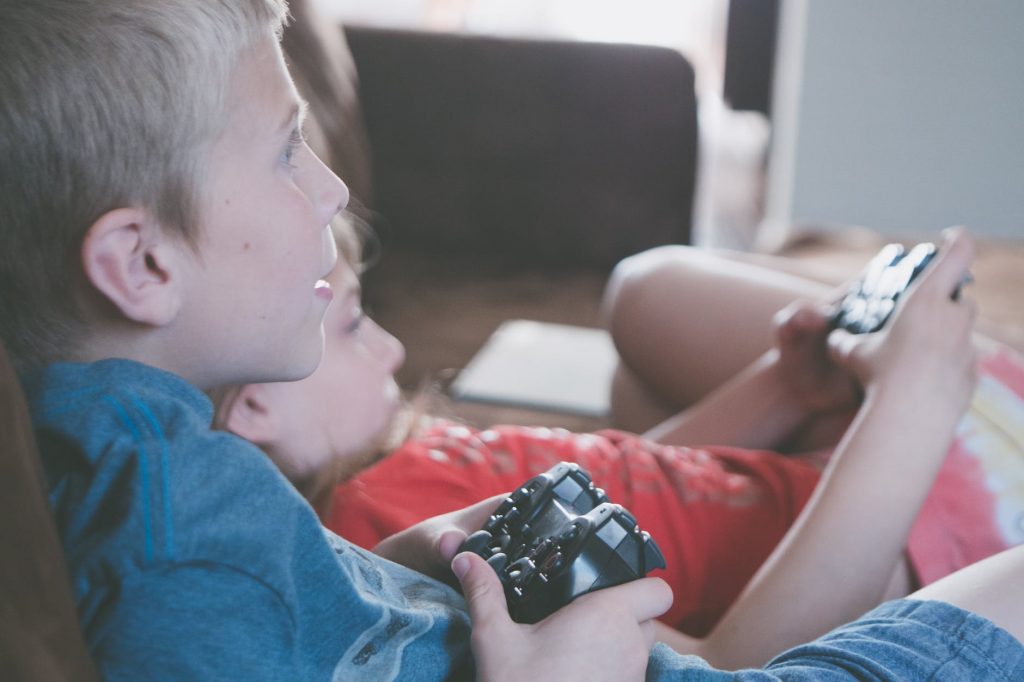This is a free essay sample available for all students. If you are looking for original essays for sale on the topic “Do Violent Video Games Cause Behavior Problems”, browse our private essay samples.
Introduction
The gaming industry has rapidly evolved in recent years, now offering complex games that require teams to compete against one another and engage in virtual violence. It is understandably a major cause of concern for more conservative parents.
The question is, do violent video games cause negative behavioral changes? Are these parental concerns warranted? The author of this sample argumentative essay looks at arguments for and against violent video games.
To get help with your essay requirements, feel free to reach out to us. We would be happy to introduce you to our affordable and top-quality essay writing services.
How Does Violent Video Games Cause Behavior Problems
These days, young people are no longer fazed by violent video games. These war games and action-packed series such as Grand Theft Auto that simulate real-world violence are now such a common sight in most family rooms that even children play them with their friends for countless hours.

One can understand how many parents can be extremely concerned. They wonder if playing these games leads to actual criminal behavior in the future. Does displaying violent behavior virtually increase aggressive behavior in real life? How does it affect someone’s mental health? Are there positive effects at all when it comes to playing video games? Do we blame video games for creating a generation that has no remorse for their harmful actions and deeds?
In this essay, I would like to outline arguments for and against the premise that video game violence can cause increased aggression in kids.
Arguments Why Do Violent Video Games Cause Behavior Problems
Video game addiction can create a fixation on aggressive problem-solving
Some research shows that violent video games have a tendency to be addictive as a form of entertainment, thus hooking players to spend countless hours playing them. As they get fixated, they are exposed to countless violent images online that mirror real-world aggression. Some psychologists believe that these formats are even more dangerous than their movie and television counterparts, which is saying a lot.
As young people are more immersed in the gaming format, this has a negative effect on their conflict resolution problems. As they have practiced aggressive behavior during gaming, they will tend to turn towards these solutions in daily life. It becomes a way for them to release pent-up anger during a conflict through physical contact and bodily harm.

Video games cause children to orient themselves around violent play
It is a sad reality that even children who are still at a tender age are exposed to violent content. As their brains are still rapidly developing, even this type of exposure is rapidly absorbed by the brain, causing negative behavioral changes. It can affect even the way they navigate through their social life as young ones, prompting them to practice harmful moves that their video game characters can do on other young children. This is perhaps why violence in the playground can occur, as kids can claim that they were only practicing what they were used to playing onscreen.
Virtual violence causes the player to intimately identify with the aggressor
Two studies in the American Psychological Association’s Journal of Personality and Social Psychology showed clear evidence that spending a lot of time playing video games such as Doom and Mortal Kombat can intensify someone’s thoughts, feelings, and behaviors of aggression in everyday life. This is what can usually happen when immersed in a game that is rich in storytelling. One starts to slowly form a bond with the violent character as he or she starts to feel like he or she is part of the story. In the same study, it was discovered that even brief exposure to these virtual experiences causes a temporary flare-up in aggressive behavior.
Even video games with less violence can cause anxiety and depression in adolescents
While a lot of the focus has been on games with obvious violent content, there are also studies on less aggressive counterparts. Such games, when also played for hours on end, have the tendency to cause anxiety and depression in young players.
A violent game encourages the formation of a script or narrative of aggression
Although not all teenagers who play violent video games end up being aggressive people, researchers found that constant exposure to this form of entertainment can cause a “script of aggression” to subconsciously form. These individuals will then turn to these as an automatic hostile response when they encounter someone they perceive to pose a threat against them. They become triggers to a young person’s aggressive behavior. In the same way that they experience killing enemies on the screen, they make it a learned practice to eliminate personal threats in everyday life when provoked.
Violent games reorient a young person’s understanding of aggression
When you watch and participate in something for a very long and sustained period of time, you start to integrate it into your worldview. This is what happens when children are constantly exposed to violence. The games they play are defining this concept for them, so when something exhibits similar triggers and traits in the real world, they are then prompted to respond in the same way that they would neutralize a threat in the gaming world.
This can pave the way from one act of unnecessary violence to another. When this kind of programming happens to a young brain, it can be very difficult to unlearn. Parents of kids who engage in these experiences often witness several physical rumbles among siblings on a daily basis as they utter lines from a video game they just played.
Arguments Why Playing Violent Video Games Doesn’t Lead To Violent Behavior
Playing violent video games doesn’t necessarily connect to long-term behavior
While some researchers have found that participating in violent video games leads to a temporary emergence of harmful behavior, many other studies refute its impact on long-term habits. While there may be a brief glimpse of increased aggression upon the first few exposures, these violent games in the end act as a kind of forum where players learn and practice necessary physical solutions to end a conflict. Instead of the negative effects, they are perceived to have on players, they actually become a training ground for the future application of these scenarios when it is called for and necessary.

Age restrictions filter out qualified players
The good news about more violent video games is that most of these impose firm age limits on usage, effectively barring more vulnerable and sensitive young populations from exposure. However, this then becomes the prime responsibility of the parents or guardians at home. They are now charged with making the final call as to whether or not their unqualified kids can play with their older siblings for the sake of peace and quiet.
The problem is that many children who are not yet technically allowed to play these games are still unwittingly exposed through their older siblings. At this point, it becomes a major concern to coach parents on setting healthy boundaries between siblings in order to prevent additional unwanted experiences.
There is still no substantial and definitive body of evidence that proves the link between virtual and real-world violence
The most important argument against the issue of violent video sessions creating aggressive individuals is the science that doesn’t yet back it up. To date, while there have been some minor studies that show a minuscule, insignificant effect on actual behavior in particular populations, there have been no convincing results from studies that solidify the cause-and-effect theory for this particular scenario. Young people can play games that are a bit more aggressive than others and not necessarily carry on these traits and actions in their everyday experiences.
A violent video game does not automatically equate to irresponsible parenting or bad entertainment choices. With healthy boundaries in active listening skills in place at home, there can be space to process each gaming experience between parents and kids, which might mitigate the potential effects of exposure.

It is still a matter of personal choice
At the end of the day, even when narratives and scripts may be adjusted coming off a gaming experience, it is still up to the player on whether or not he or she will imitate everything he or she learned during a game. Free will is impossible to quantify, so this will always be a variable and a wild card in the continued study of the effects of playing violent video games on children. With a safe and healthy home environment, they can benefit from the proactive role their guardians will take in ensuring that they always have a sounding board to process their experiences with.
FAQs
How Violent Games Affect The Brain?
These types of games can be addictive, causing the player to form a fixation not just on the game itself, but the experience. This explains why so many players end up staying on the couch for many hours. There is something about these games that also change the player’s narrative. Being exposed for a prolonged period of time can redefine what is or isn’t a threatening situation to you, and this can affect how the brain is rewired to respond to a similar situation in everyday life.
At the same time, it changes the player’s perception of an aggressor, as they will identify with the character in the game and relate it to the people they encounter in reality. This will then be the new definition that will determine how they respond to a perceived threat in life.
How Do Video Games Affect Society?
While there are mixed opinions on how society is affected when people play video games, the general consensus is that there is no major effect. If anything, a positive change that comes out of it is that players, who are already integrated into the fabric of the community, learn how to deal with real-world situations that may be physically threatening. Using what they have learned from and practiced on the screen, they use these tactics and methods to disarm threats that they personally encounter. It helps them find real ways to navigate through a physical conflict and come out victorious.